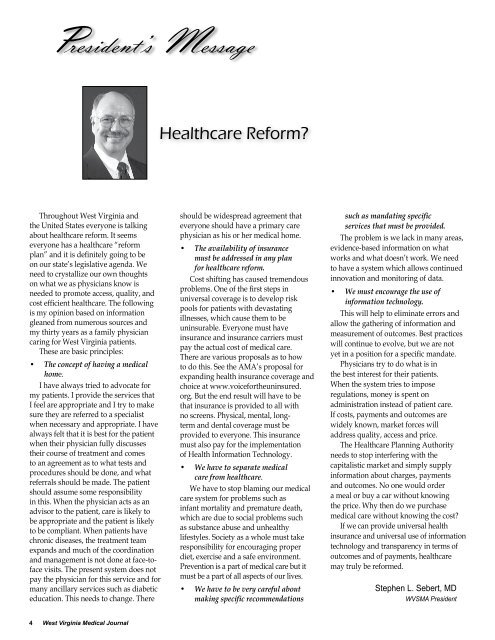January/February - West Virginia State Medical Association
January/February - West Virginia State Medical Association
January/February - West Virginia State Medical Association
Create successful ePaper yourself
Turn your PDF publications into a flip-book with our unique Google optimized e-Paper software.
President’s Message<br />
Healthcare Reform?<br />
Throughout <strong>West</strong> <strong>Virginia</strong> and<br />
the United <strong>State</strong>s everyone is talking<br />
about healthcare reform. It seems<br />
everyone has a healthcare “reform<br />
plan” and it is definitely going to be<br />
on our state’s legislative agenda. We<br />
need to crystallize our own thoughts<br />
on what we as physicians know is<br />
needed to promote access, quality, and<br />
cost efficient healthcare. The following<br />
is my opinion based on information<br />
gleaned from numerous sources and<br />
my thirty years as a family physician<br />
caring for <strong>West</strong> <strong>Virginia</strong> patients.<br />
These are basic principles:<br />
• The concept of having a medical<br />
home.<br />
I have always tried to advocate for<br />
my patients. I provide the services that<br />
I feel are appropriate and I try to make<br />
sure they are referred to a specialist<br />
when necessary and appropriate. I have<br />
always felt that it is best for the patient<br />
when their physician fully discusses<br />
their course of treatment and comes<br />
to an agreement as to what tests and<br />
procedures should be done, and what<br />
referrals should be made. The patient<br />
should assume some responsibility<br />
in this. When the physician acts as an<br />
advisor to the patient, care is likely to<br />
be appropriate and the patient is likely<br />
to be compliant. When patients have<br />
chronic diseases, the treatment team<br />
expands and much of the coordination<br />
and management is not done at face-toface<br />
visits. The present system does not<br />
pay the physician for this service and for<br />
many ancillary services such as diabetic<br />
education. This needs to change. There<br />
should be widespread agreement that<br />
everyone should have a primary care<br />
physician as his or her medical home.<br />
• The availability of insurance<br />
must be addressed in any plan<br />
for healthcare reform.<br />
Cost shifting has caused tremendous<br />
problems. One of the first steps in<br />
universal coverage is to develop risk<br />
pools for patients with devastating<br />
illnesses, which cause them to be<br />
uninsurable. Everyone must have<br />
insurance and insurance carriers must<br />
pay the actual cost of medical care.<br />
There are various proposals as to how<br />
to do this. See the AMA’s proposal for<br />
expanding health insurance coverage and<br />
choice at www.voicefortheuninsured.<br />
org. But the end result will have to be<br />
that insurance is provided to all with<br />
no screens. Physical, mental, longterm<br />
and dental coverage must be<br />
provided to everyone. This insurance<br />
must also pay for the implementation<br />
of Health Information Technology.<br />
• We have to separate medical<br />
care from healthcare.<br />
We have to stop blaming our medical<br />
care system for problems such as<br />
infant mortality and premature death,<br />
which are due to social problems such<br />
as substance abuse and unhealthy<br />
lifestyles. Society as a whole must take<br />
responsibility for encouraging proper<br />
diet, exercise and a safe environment.<br />
Prevention is a part of medical care but it<br />
must be a part of all aspects of our lives.<br />
• We have to be very careful about<br />
making specific recommendations<br />
such as mandating specific<br />
services that must be provided.<br />
The problem is we lack in many areas,<br />
evidence-based information on what<br />
works and what doesn’t work. We need<br />
to have a system which allows continued<br />
innovation and monitoring of data.<br />
• We must encourage the use of<br />
information technology.<br />
This will help to eliminate errors and<br />
allow the gathering of information and<br />
measurement of outcomes. Best practices<br />
will continue to evolve, but we are not<br />
yet in a position for a specific mandate.<br />
Physicians try to do what is in<br />
the best interest for their patients.<br />
When the system tries to impose<br />
regulations, money is spent on<br />
administration instead of patient care.<br />
If costs, payments and outcomes are<br />
widely known, market forces will<br />
address quality, access and price.<br />
The Healthcare Planning Authority<br />
needs to stop interfering with the<br />
capitalistic market and simply supply<br />
information about charges, payments<br />
and outcomes. No one would order<br />
a meal or buy a car without knowing<br />
the price. Why then do we purchase<br />
medical care without knowing the cost?<br />
If we can provide universal health<br />
insurance and universal use of information<br />
technology and transparency in terms of<br />
outcomes and of payments, healthcare<br />
may truly be reformed.<br />
Stephen L. Sebert, MD<br />
WVSMA President<br />
<br />
<strong>West</strong> <strong>Virginia</strong> <strong>Medical</strong> Journal















